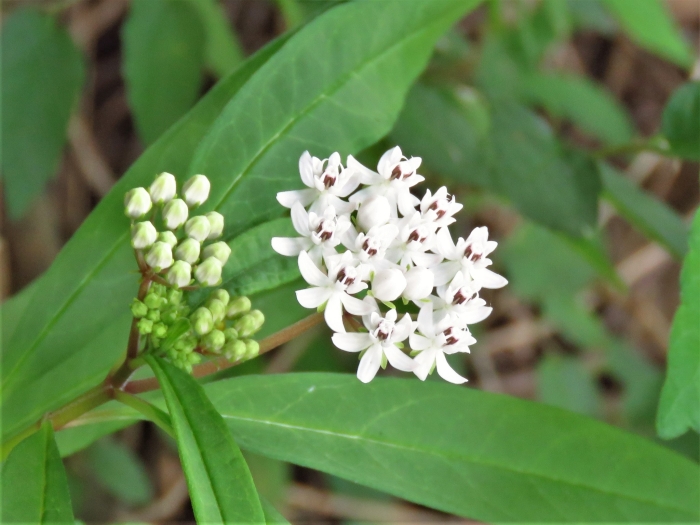Aquatic Milkweed
(Asclepias perennis)
Aquatic Milkweed (Asclepias perennis)
/
/

Annika Lindqvist
CC BY 4.0
Image By:
Annika Lindqvist
Recorded By:
Copyright:
CC BY 4.0
Copyright Notice:
Photo by: Annika Lindqvist | License Type: CC BY 4.0 | License URL: http://creativecommons.org/licenses/by/4.0/ | Rights Holder: Annika Lindqvist | Publisher: iNaturalist | Date Created: 2020-07-09T08:56:40-07:00 |





















































Estimated Native Range
Summary
Asclepias perennis, commonly known as Aquatic Milkweed, is an evergreen perennial herb native to wetlands, marshes, and stream banks in the Southeastern USA. It is cold-hardy and forms a strong fibrous, sometimes woody, rootstock. The plant typically grows to 46–61 cm (18–24 in) in height. Aquatic Milkweed has clusters of small, fragrant flowers that are about 2 mm (0.079 in) in diameter and 3–4 mm (0.12–0.16 in) in length. The flowers have pedicels about 1 cm (0.39 in) long, and their color ranges from whitish to pink, blooming from late spring to early fall. The horns of the flowers extend beyond the hoods, and the corollas are reflexed, making for a delicate and attractive display.
Aquatic Milkweed is valued for its role as a host plant for monarch butterflies, supporting their lifecycle by providing food for the larvae. It is also appreciated for its ease of cultivation and ability to thrive in wet conditions, making it suitable for rain gardens, water features, and naturalized areas. It is commercially available by both seed and propagated plants, with seed readily germinating. Mature flowering plants can be grown in as little as three to four months. Plants can be successfully grown in containers as small as a quart, with the number of stems increasing with the size of the container. This species requires abundant water, and the substrate should retain good moisture levels and rarely, if ever, dry out. Cold hardiness has been noted to -23 °C. In cultivation, it generally does best in full sun or part shade, with high amounts of water, and in soils with slow drainage. Gardeners should be aware that while not aggressive, it can spread in ideal wet conditions.CC BY-SA 4.0
Aquatic Milkweed is valued for its role as a host plant for monarch butterflies, supporting their lifecycle by providing food for the larvae. It is also appreciated for its ease of cultivation and ability to thrive in wet conditions, making it suitable for rain gardens, water features, and naturalized areas. It is commercially available by both seed and propagated plants, with seed readily germinating. Mature flowering plants can be grown in as little as three to four months. Plants can be successfully grown in containers as small as a quart, with the number of stems increasing with the size of the container. This species requires abundant water, and the substrate should retain good moisture levels and rarely, if ever, dry out. Cold hardiness has been noted to -23 °C. In cultivation, it generally does best in full sun or part shade, with high amounts of water, and in soils with slow drainage. Gardeners should be aware that while not aggressive, it can spread in ideal wet conditions.CC BY-SA 4.0
Plant Description
- Plant Type: Herb
- Height: 1.5-2.5 feet
- Width: 0.6-1 feet
- Growth Rate: Moderate
- Flower Color: White
- Flowering Season: Spring, Summer, Fall
- Leaf Retention: Evergreen
Growth Requirements
- Sun: Full Sun, Part Shade
- Water: High
- Drainage: Slow
Common Uses
Bee Garden, Bird Garden, Butterfly Garden, Deer Resistant, Drought Tolerant, Fragrant, Hummingbird Garden, Low Maintenance, Showy Flowers, Street Planting, Water Garden
Natural Habitat
Native to wetlands, marshes, and stream banks in the Southeastern USA
Other Names
Common Names: White Swamp Milkweed, Smooth-Seed Milkweed, White Milkweed
Scientific Names: , Asclepias perennis, Asclepias perennis var. parvula, Asclepias debilis, Asclepias parvifolia, Asclepias parvula, Asclepias lancifolia, Asclepias matelea, Asclepias parviflora var. latifolia, Asclepias pulchella
GBIF Accepted Name: Asclepias perennis Walter